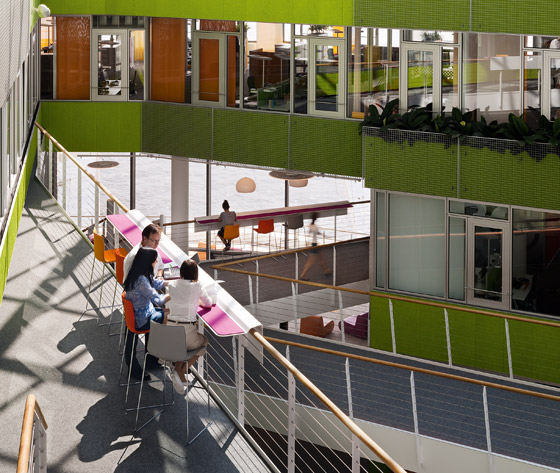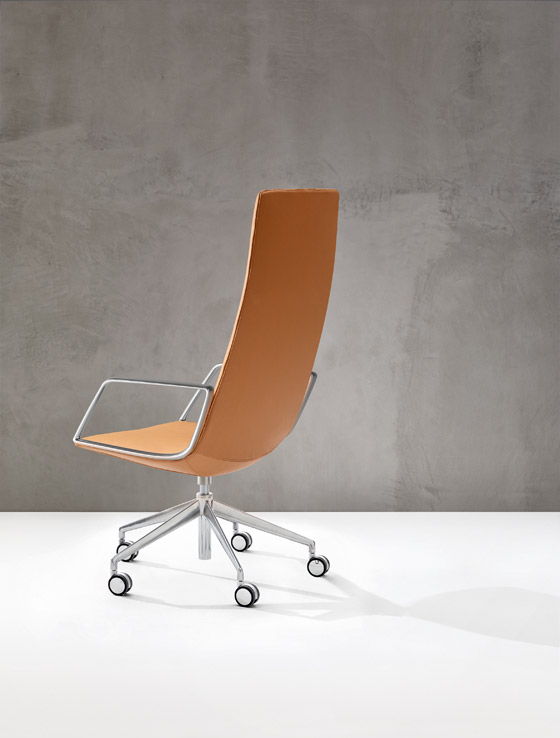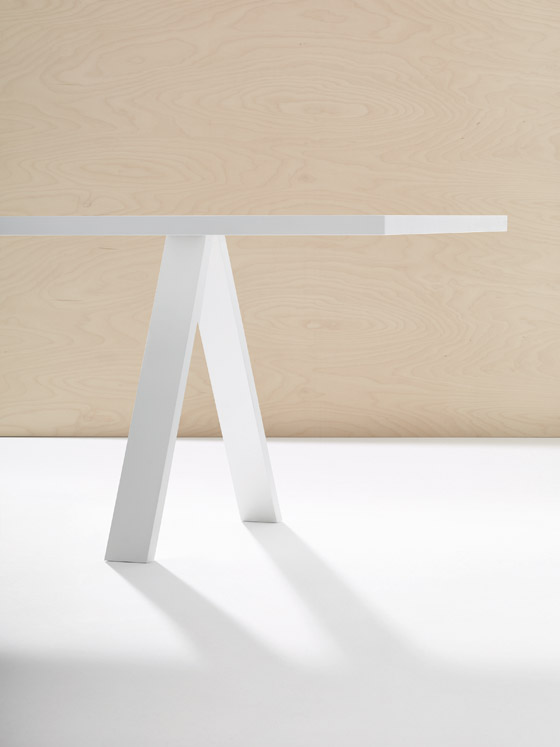Working It, Living It
Brand story by Simon Keane-Cowell
Monastier di Treviso, Italie
21.03.15
Premium Italian design brand Arper has made it its job to look at our jobs – the ongoing changes in the where and the how we work – responding with a collection of high-performance furniture designs that don't slack off in the aesthetics department.
The 'Catifa 46' stool in situ and in service at Unilever's HQ in Hamburg; photo: Adam Mørk
Hello. I’m writing this from home. Perhaps not the most fascinating of facts and yet at the same time an interesting point precisely in its unremarkableness. For the past few years has seen an evolution in not only the where, but also the how, we work, one where smart working beyond the boundaries of the traditional office has gone from being an event to part of the everyday.
The oft-cited work-life balance as a guiding mantra for the way we live (or should live) today may, on the one hand be a bit of a false dichotomy – it sets up work as a concept that’s somehow discrete from life, whereas it, in reality, shapes who we are to a large extent, defines our social identities – but it’s nonetheless a neat and useful opposition. Whether you’re someone who works to live or lives to work, it makes us mindful of the fact that work, while a necessity, should as much as possible be an enriching and enabling force that helps us maintain ourselves as healthy, happy individuals.
The latest addition to the 'Catifa' family, Lievore Altherr Molina's 'Catifa Sensit' features an integrated mechanism in the back of the chair, allowing it to recline seamlessly and effortlessly for second-to-none ergonomic support; photo: Marco Covi
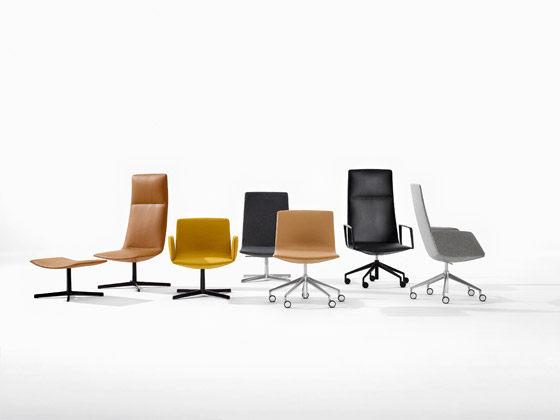
The latest addition to the 'Catifa' family, Lievore Altherr Molina's 'Catifa Sensit' features an integrated mechanism in the back of the chair, allowing it to recline seamlessly and effortlessly for second-to-none ergonomic support; photo: Marco Covi
×In spite of the fact that many experts – among them social and medical scientists and, indeed, economists – argue that shortening the working week would increase personal effectiveness and well-being, we continue across the developed world to work at times punishingly long hours. Work-related, stress-based illnesses are on the rise, a phenomenon that’s inversely proportional, of course, to productivity. Keeping that work-life balance, well, balanced is now more than ever a priority. Clever employers have recognised that empowering their staff to decide for themselves where and when they work has a net benefit to their organisations in terms of job-satisfaction and long-term loyalty. Being good to yourself is, in short, good for us all.
While digital technology, in the form of email, video-conferencing and cloud-computing, has more than any other development given us the freedom to work more flexibly, blurring the boundaries of the workplace and the workday, a number of leading design manufacturers have cleverly identified the role that products can and should play in responding to the temporal and structural shifts in work practices that have emerged in recent years. Chief among them is premium Italian brand Arper, which has pioneered the concept of ‘soft-tech’ design – dynamic and adaptable task furniture that’s at home in your home as much as in the office (and indeed in any workspace in between, such as hotel lobby, cafe or departure lounge).
If you’ve ever picked up an Arper catalogue or visited an Arper fair stand, you’ll know already that this is a company that likes to do things right. Perfectionists, if you will. Immaculate typography and exquisite photography, underpinned by second-to-none art direction are the hallmarks of Arper’s brand communications. It should come as no surprise then that such a Gesamtkunstwerk approach has also been rigorously applied to the development of its latest suite of furniture designs – chairs and tables that punch well above their weight. For the super-compliant ‘Kinesit’ office chair, the super-silhouetted ‘Catifa Sensit’ task chair and the super-strong ‘Cross’ table, while all offering exemplary performance on a utilitarian, functional level, work just as hard in terms of aesthetics, articulating as they do a carefully honed, warm and humane design language that encourages users to form emotional connections with them – a softness, if you will. As Barcelona-based studio Lievore Altherr Molina, which enjoys a long-standing partnership with Arper as both designers and art directors, puts it, ‘Furniture is the part of the environment that is closest to the body. People identify strongly with objects.’
Arper's best-selling 'Catifa' family of chairs has been helping people work – wherever that may be – for almost 15 years. Top: the David Rubenstein Atrium at New York's Lincoln Center; above: the Paris-Sorbonne University
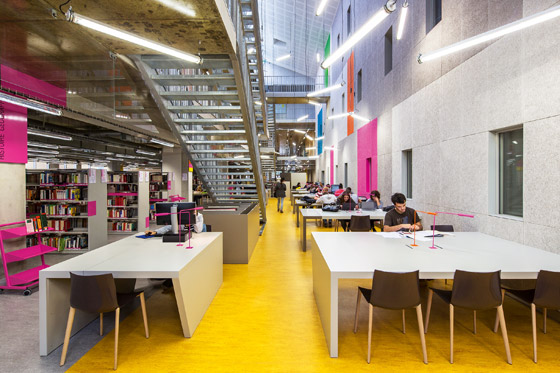
Arper's best-selling 'Catifa' family of chairs has been helping people work – wherever that may be – for almost 15 years. Top: the David Rubenstein Atrium at New York's Lincoln Center; above: the Paris-Sorbonne University
×For what Arper has created are, in effect, tools that support contemporary living in all its, at times confusing and overlapping, diversity of content – work, relaxation, socialising – by producing furniture that conceals its innovative technological smarts in kind and friendly design forms that you’d be more than happy to have shape your environment - at home or in the office or in a space somewhere between - be it when you’re enjoying some down-time or have your nose to the grindstone. Place the ‘Kinesit’ chair (which has a self-tensioning weight response mechanism invisibly integrated inside the seat, allowing it to adapt to the natural movements of the user’s body) in an office, for example, and it speaks of personal taste as much as professional competence. Introduce the ‘Cross’ table into a domestic space and it allows you to bring together family and friends for intimate gatherings as well as colleagues and collaborators for work discussions. These are objects that help express the fullness of the modern self and help keep its constituent parts in balance. Again, it’s about being good to yourself by choosing to live with products that hide their hardware within their software, so to speak, allowing us to fashion spaces that are aligned with our personal sensibilities.
Barcelona design office Lievore Altherr Molina's 'Kinesit' chair, Arper's first office chair to comply 100% with regulatory requirements, comes with a concealed mechanism under the seat to provide sychronised movement; photo: Marco Covi
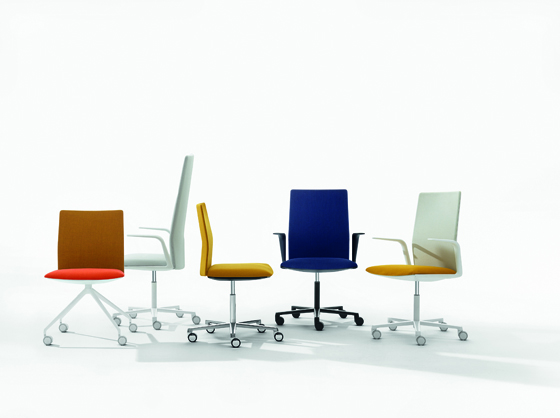
Barcelona design office Lievore Altherr Molina's 'Kinesit' chair, Arper's first office chair to comply 100% with regulatory requirements, comes with a concealed mechanism under the seat to provide sychronised movement; photo: Marco Covi
בArper has always focused on the concepts of product versatility and multi-functionality,’ explains its CEO Claudio Feltrin, ‘reflecting on the notion of “soft” contract and planning from the outset – flexible collections that can be successfully used in both public spaces and modern home environments. We have always viewed contract spaces with the conviction that beauty and flexibility – qualities that are traditionally associated with the residential sector – can also be applied to public places and work spaces.’ The fact that Arper’s ‘Catifa’ chair was first presented at Orgatec over 13 years ago and has been successful ever since should leave you in little doubt that a commitment to delivering innovative design at the interface between the spheres of work and home life is an integral part of the Arper DNA. It’s what they do. And they do it well.
Equally at home in the office or, indeed, at home, the archly architectural 'Cross' table, by Fattorini+Rizzini+Partners, is strong, expansive and adaptable, providing more than enough space for collaborative working and socialising; photo: Marco Covi

Equally at home in the office or, indeed, at home, the archly architectural 'Cross' table, by Fattorini+Rizzini+Partners, is strong, expansive and adaptable, providing more than enough space for collaborative working and socialising; photo: Marco Covi
×But there’s no resting on laurels here. Our cultural and economic landscapes are in constant flux. How we live and earn our daily bread never stays the same. Arper continues to monitor shifts in work patterns and identify emerging trends in the way we do business, allowing the manufacturer to cast, as Feltrin puts it, ‘an ever fresh eye on the office chair and other dedicated office furnishings’. Looking at how we do our jobs has become their ongoing job. Future-gazing, the Arper chief sees workplaces down the line, in whatever form they take, as ‘more multifunctional and adaptable, technology-enabled and comfortable. Workers of the future will expect to be able to work in environments that reflect their values – including aesthetic values – and support their aspirations.’
Arper CEO Claudio Feltrin: 'Workers of the future will expect to be able to work in environments that reflect their values – including aesthetic values – and support their aspirations.’
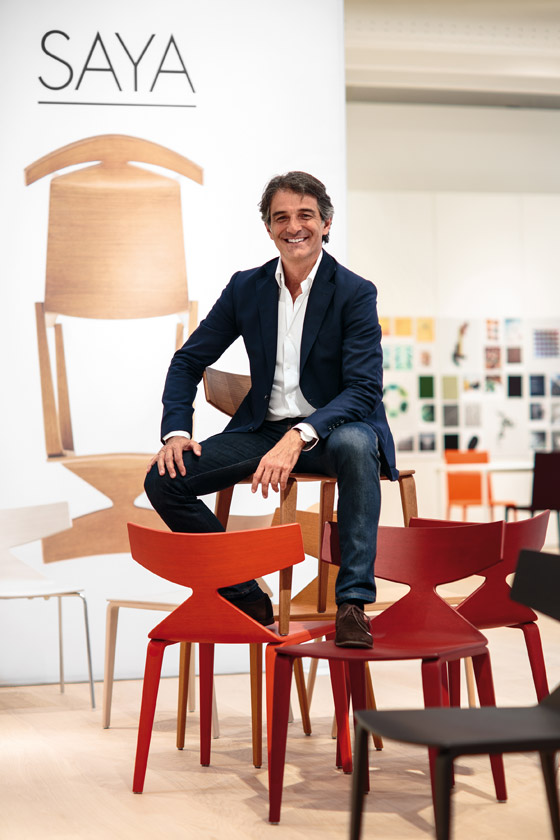
Arper CEO Claudio Feltrin: 'Workers of the future will expect to be able to work in environments that reflect their values – including aesthetic values – and support their aspirations.’
×That said, there’s an essential and immutable Arper thread that runs through all of their products, old and new, regardless of how the world out there changes and how its furniture responds to such change. It’s this thread, according to Feltrin, that has secured the company’s position as a go-to brand for functionality, comfort and elegance: ‘A fundamental factor for success,’ he maintains, ‘is understanding and interpreting changes and readily translating them into winning ideas and choices without abandoning one’s values and remaining faithful to the project identity and philosophy of the company.’
Ultimately, Arper as a brand is a bit like your best employee. Ever dependable, yet constantly adaptable, and always ready to surprise you.
....

